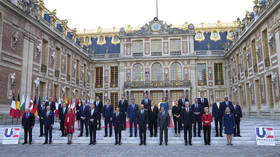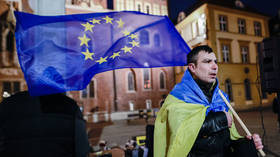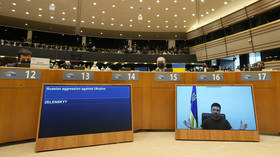EU leaders rule on fast-tracked membership for Ukraine

The EU has condemned the Russian offensive and pledged its support to Ukraine on its path to European Union membership, but stopped short of fast-tracking its application to join the bloc.
Kiev submitted its EU application in late February, with President Volodymyr Zelensky asking Brussels to accelerate its assessment of the bid in view of the ongoing fighting in his country.
The bloc’s leaders debated the issue for hours on the first day of the European Council summit, convened at the Palace of Versailles, outside Paris, issuing a joint statement late on Friday.
They condemned what they described as Russia’s “unprovoked and unjustified military aggression” against its neighbor, and demanded Moscow “immediately and unconditionally” withdraw its forces from Ukrainian territory.
Council members pledged to “continue to provide coordinated political, financial, material, and humanitarian support” to Kiev.
As for fast-tracked EU membership, they “acknowledged the European aspirations and the European choice of Ukraine,” and said the European Council had acted “swiftly” in passing Kiev’s bid to the European Commission to elicit its opinion.
However, this is just the first step in what is a lengthy bureaucratic process to join the EU, with the statement containing no hints that Ukraine would be allowed to take any shortcuts along the route.
In a press briefing after the summit, Dutch Prime Minister Mark Rutte clarified that the assessment of Kiev’s bid by the commission would take time – “months, maybe years.” Brussels had nonetheless been treating the application with unprecedented speed, he said.
Despite calling the Ukrainian people “heroic,” Lithuanian President Gitanas Nauseda acknowledged that it was “impossible to grant EU candidate status to Ukraine today.”
“We were divided,” Slovenian Prime Minister Janez Jansa said of the summit. The majority of the bloc’s leaders agreed that the Ukrainians needed a “strong political message that they belong to our European family,” but there were also many among the delegates who were “still debating the procedures” by which that might be enacted, he added.
Moscow attacked its neighbor in late February, following a seven-year standoff over Ukraine’s failure to implement the terms of the Minsk agreements, and Russia’s eventual recognition of the Donbass republics of Donetsk and Lugansk. German- and French-brokered proposals had attempted to regularize the status of those regions within the Ukrainian state.
Russia has demanded that Ukraine officially declare itself a neutral country that will never join the US-led NATO military bloc. Kiev insists the Russian offensive was completely unprovoked and has denied claims it was planning to retake the two republics by force.














